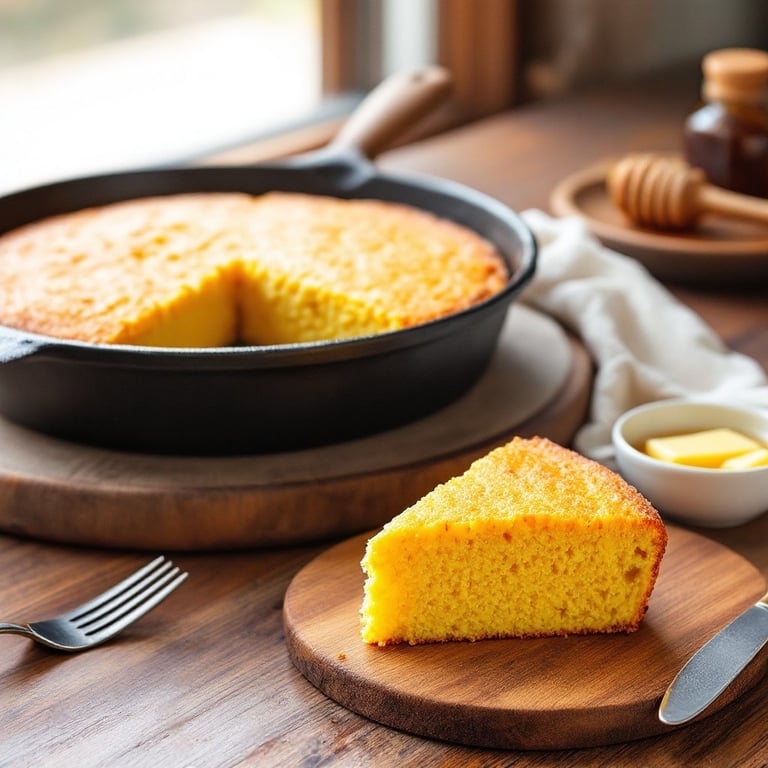Skillet-Baked Cornbread
Golden, crumbly, and rich with tradition — this skillet-baked cornbread brings the warmth of the American South to your table. Perfect for served with a barbecue, chili, or simply enjoying it warm for breakfast, this easy, comforting bread is a delicious tribute to generations of heritage.
SIDE DISHBREAKFASTEASY TO MAKE
Lourdes Rodriguez
4/16/20253 min read


The Story this Dish Tells
Cornbread is more than just a typical side dish from the American South. It is a symbol of cultural fusion between Indigenous peoples and European settlers. Its main ingredient, cornmeal, was a dietary staple for many Native American communities such as the Cherokee, Chickasaw, Choctaw, and Creek, long before Europeans arrived in North America.
These communities used corn in various preparations, from porridges to cakes cooked over hot ashes. When British colonists arrived, especially in the Southern English Colonies, they learned from Native Americans about the nutritional value and versatility of corn. Lacking European wheat, the settlers adapted their traditional bread recipes using ground corn and early versions of cornbread were born.
Over the centuries, cornbread became a staple in Southern households, beloved for its simplicity, rustic flavor, and versatility. It can be sweet or savory, baked in a skillet, fried, or even steamed. It is served both in everyday meals and during traditional holidays like Thanksgiving.
Interestingly, there is a cultural difference in how it has made: in the Southern U.S., cornbread is usually drier and contains little or no sugar; in the North, it tends to be sweeter and cake-like.
Health Benefits
Cornmeal is a good source of fiber and antioxidants like lutein
Naturally gluten-free (if made with certified gluten-free flour)
Low in saturated fats when made with vegetable oil
Prep Tips
A well-preheated cast iron skillet gives the crust that irresistible golden crunch
For a less sweet version, use just 2 tablespoons of sugar
You can swap the oil for melted butter for extra flavor
Best Season to Enjoy It
While cornbread is delicious year-round, it’s especially popular in the fall and winter, often served during holidays or cozy family dinners.
Food Safety Considerations
Contains raw eggs – avoid consuming the batter uncooked
Ensure proper baking (internal temp of at least 190°F / 88°C)
Skillet-Baked Cornbread Recipe
Bake time: 30 minutes
Servings: 8 to 10
Ingredients:
1½ cups stone-ground yellow cornmeal
½ cup all-purpose flour
½ cup sugar (adjustable: 2 Tbsp. for less sweet or ⅔ cup for sweeter)
1 Tbsp. baking powder
½ tsp. baking soda
½ tsp. salt
1 cup whole milk
2 eggs
⅓ cup vegetable oil
Directions:
Preheat the oven to 350°F / 177°C.
Place a 9-inch cast iron skillet in the oven to preheat.
In a medium bowl, combine all ingredients and mix until just combined.
Grease the hot skillet with oil or butter and pour in the batter.
Bake for 30 minutes, or until golden brown on top.
Serve warm and enjoy!
Storage & Shelf Life
Keeps at room temperature for up to 2 days in an airtight container
Can be refrigerated for 4–5 days or frozen for up to 2 months
Healthier Ingredient Swaps
Use unsweetened plant milk for a dairy-free version
Replace oil with unsweetened applesauce for lower fat. Although, Applesauce makes the crumb softer and denser, with less crispiness on the edges. It will feel more like a muffin or cake than traditional Southern cornbread. It also, has a mild fruity note. It will not make the cornbread taste like apple pie, but it may add a subtle sweetness and tang — more noticeable if you are using less sugar. If you want a compromise, you could try: Half oil + half applesauce - This retains some of the richness and structure of oil, while cutting back on fat.
Try coconut sugar or honey as a natural sweetener
Pairing Ideas
Chili or baked beans
Roasted or steamed vegetables
BBQ chicken or tofu
Thanksgiving stuffing base
🤓 Did you Know? In the southern United States, cornbread is prepared with little or no sugar, while in the north, it is sweeter and cake-like. A historical flavor dispute!
Dietary Restrictions to Consider
This recipe contains:
Gluten – due to all-purpose flour (can be substituted with gluten-free blend)
Eggs – not suitable for those with egg allergies (can substitute flax eggs)
Dairy – from milk (can be swapped for plant-based milk)
Sugar – contains added sugar (can reduce or replace with alternatives)
Important: If you have questions about how to incorporate this food into your diet, it's always a good idea to consult your dietitian or doctor.
Plenitaste
Inspiring healthy, global recipes for everyone.
contact me:
Recipe
plenitaste@gmail.com
© 2025. All rights reserved.
